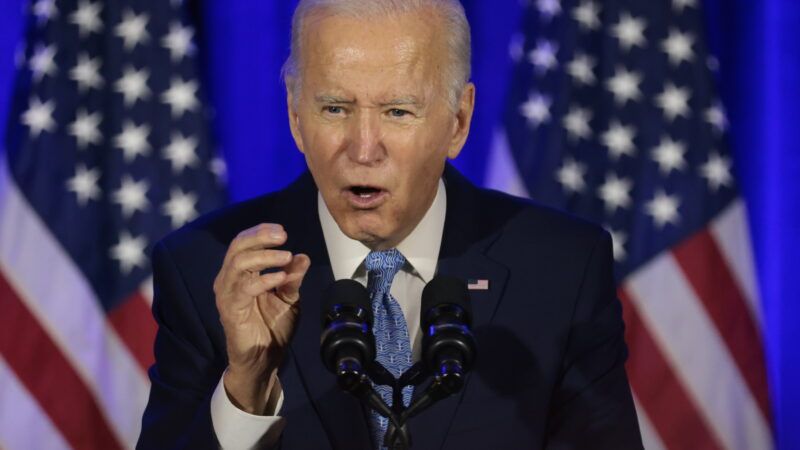Biden Doubles Down on a Lethal Anti-Drug Strategy
Prohibition has driven opioid-related deaths to record levels.

For more than a century, the U.S. government has failed to prevent Americans from consuming politically disfavored intoxicants. Worse, it has systematically made drug use more dangerous by forcing consumers to rely on black-market products of unknown composition and by pushing traffickers toward increasingly potent substances that are easier to smuggle.
The ongoing "opioid crisis," which has driven drug-related deaths to record levels, illustrates both of those phenomena. But instead of recognizing the lethal effects of prohibition, President Joe Biden is doubling down on a strategy that has never worked as intended.
Last week, Biden signed two executive orders aimed at combating the "transnational criminal organizations" that "contribute directly to tens of thousands of drug-overdose deaths in the United States each year." One order replaces the federal government's Threat Mitigation Working Group with a brand-new U.S. Council on Transnational Organized Crime; the other authorizes sanctions against "foreign persons involved in the global illicit drug trade."
In the last two decades, a "senior administration official" told reporters during a conference call, "the nature of drug trafficking has changed dramatically." Illegal drugs nowadays, the official said, are "more potent, addictive and deadly and able to kill in mass numbers," as reflected in "the skyrocketing death rate from synthetic opioids."
During the year ending last May, according to estimates from the Centers or Disease Control and Prevention, the U.S. saw more than 100,000 drug-related deaths, up 23 percent from the previous year and 46 percent from the year before that. Three-quarters of those cases involved opioids, and 85 percent of the 75,000 or so opioid-related deaths involved the category that includes fentanyl and its analogs.
These record-breaking numbers reflect the perverse impact of the government's efforts to reduce drug-related deaths. The surge in fatalities followed a successful campaign to reduce opioid prescriptions, which drove nonmedical users toward black-market substitutes that are much more dangerous because their purity and potency are unpredictable.
Between 2010 and 2017, the number of opioid prescriptions per 100 Americans fell by 28 percent; the rate of high-dose opioid prescriptions—defined as 90 morphine milligram equivalents or more per day—fell by 56 percent. Meanwhile, annual opioid-related deaths have more than tripled since 2010.
In a 2017 interview with the Carlisle Sentinel, Carrie DeLone, Pennsylvania's former physician general, confessed that "we knew that this was going to be an issue, that we were going to push addicts in a direction that was going to be more deadly." Her justification: "You have to start somewhere."
For a sense of where that attitude can lead, consider what happened after OxyContin, an extended-release version of oxycodone, was reformulated to deter abuse in 2010. A 2017 National Bureau of Economic Research paper concluded that "a substantial share of the dramatic increase in heroin deaths since 2010″—perhaps as much as 80 percent—"can be attributed to the reformulation of OxyContin."
The proliferation of fentanyl as a heroin booster and substitute has compounded this problem by making potency even more variable. "Today's drug trade no longer relies on crops or requires vast acreage," the "senior administration official" noted last week, "but instead on synthetic materials and precursor chemicals."
That trend also is driven by government policy. Fentanyl, which is roughly 50 times as potent as heroin, is a logical choice for suppliers dealing with government efforts to suppress the drug trade, since it makes production and distribution less conspicuous and more profitable.
At the import level, RAND Corporation researchers estimated in 2019, "heroin appears to be at least 100 times more expensive than fentanyl." And because fentanyl is much more potent than heroin, a package weighing less than an ounce can replace one that weighs a couple of pounds.
"Historically," The Hill noted in its report on Biden's executive orders, "drug trafficking organizations have been quick to adapt to new law enforcement strategies." Yet somehow the government never seems to anticipate that reaction, or its deadly consequences.
© Copyright 2021 by Creators Syndicate Inc.

Show Comments (46)